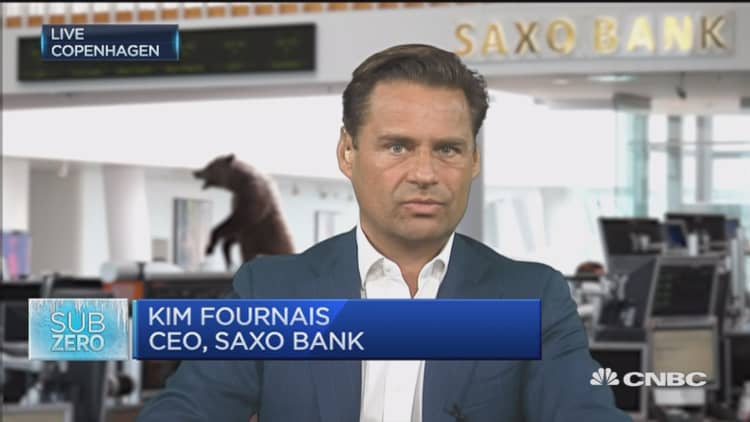
Central banks around the world are running nothing short of a "Ponzi scheme" by printing infinite amounts of cash and cutting interest rates to record lows in order to stimulate growth, the chief executive of Saxo Bank told CNBC.
"There is no real wish to do the reforms, it is much needed to see growth," Kim Fournais said Thursday.
"It goes to Europe and to some extent to the U.S. as well. The real issue here is that there is no growth. The Danish Central Bank has been lowering their forecast for three times in a row, the latest out on Wednesday. You pretty much don't see a vibrant economy."
Earlier this week, the Danish Central Bank said the economy is expected to grow 0.9 percent this year, down from its June forecast of one percent. The bank also cut its 2017 forecast to 1.5 percent from 1.6 percent estimated in June.
Denmark adopted negative interest rates almost half a decade back in order to stimulate growth in the economy and increase inflation. The country has been one of the first few to adopt negative rates for lending and mortgages.
"Negative rates are a problem everywhere and it is punishing people with cash which is not a good incentive structure", Fournais told CNBC.
In a research note from the Association of Danish Mortgage Banks, authors Peter Jayaswal and Lars Ravn Knudsen said negative rates create uncertainty. "Negative interest rates represent unknown territory and present some challenges to various parts of society and the economy, primarily due to the fact that until recently a negative interest scenario has not been part of the dominating discourse. The funding of loans by covered bond issuance gives rise to challenges both in relation to borrowers and investors."
Saxo Bank's Fournais told CNBC echoed these concerns, adding that the problem is with major democracies focusing on redistribution and welfare state which is suffocating the ability for people to collaborate.
"There are lots of rules, bureaucracy and taxes are quite high and I think it is quite an anemic situation we are in."
He added that governments have left to central banks to pump money into the world and to see growth because there is inability between politicians to see what is needed.
"If that's not going to change and we have seen what happened in Greece, or in places where capital markets are losing complete confidence, then it's too late for reforms and it ends up in downward spiral."


